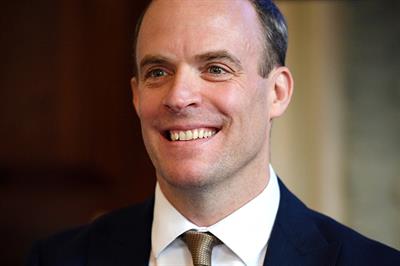
By Jocelyn Timperley
Hardline brexiteer Dominic Raab, currently fourth of the seven remaining contenders to become the UK’s next prime minister, this week attempted to position himself as a pro-environment candidate.
In an apparent attempt to broaden his appeal, the former Brexit secretary on Monday stated his plans to make Britain a world leader in tackling climate change.
“As Conservatives, we’ve got to harness the power of innovation and technology to forge an energy policy that makes environmental and economic sense,” he told The Times. “We’ve got to look to the future. We’ve got to leave the environment in a better state than we found it.”
However, many commentators regard Raab’s recent interest in environmental issues with heavy scepticism.
“It’s all just stuffing for the headlines and the media,” said Tom Burke, chairman and founding director of E3G. “It’s got nothing to do with what [the ‘hard’ brexiteers] would actually do. And people should not really pay any attention to it.”
Mary Creagh, Labour MP and chair of the cross-party Environmental Audit Committee (EAC), had a similar view. “Dominic Raab supports a no-deal Brexit, which would be a catastrophe for the UK’s environment [and] take us back to being the dirty man of Europe,” she said. “To protect the environment, we must avoid both a no-deal Brexit and Dominic Raab as prime minister.”
Investigative journalism website DeSmog UK weighed in with its view last year, setting out what it says are Raab’s links to individuals and organisations pushing climate science denial.
“I don’t think he himself is a climate change denier, but those around him and those supporting him do not support [the environmental] agenda at all,” said Ned Westaway, a London barrister and vice chair of the UK Environmental Law Association (UKELA).
‘Unknown quantity’
Despite the brief green tinged comments at his leadership launch, Raab is not known for saying much on the environment. “He is a bit of an unknown quantity from an environmental perspective, because he’s frankly done very little in this area,” says Westaway.
Heather Fraser, a member of the local Friends of the Earth group in Elmbridge, met with Raab in March along with three of her colleagues. The meeting, which aimed to gain Raab’s support for the Plastic Pollution Bill going through parliament, was one of several between the group and Raab after he invited them to meet with him. But Fraser says he has been reluctant to make any commitments, with it difficult garner his views on most topics.
“He doesn’t really have a view most of the time we talk to him about anything,” she said. “He’s a very very polite and charming man, and he listens to us, and then he just defers to the minister, usually of DEFRA.
“He appears to generally agree with the sentiment, but he won’t ever finally sign up to anything. So it’s difficult to judge whether he actually does agree with it or if he’s just being very cautious.”
The group has also probed him on the environment impacts of Brexit. “He seemed to imply that it wouldn’t have any detrimental effect on the environment,” said Fraser.
Deep deregulation
But Raab’s stance on Brexit is exactly why so many are concerned about what his premiership would mean for the environment. Raab has also been an active supporter of the European Research Group (ERG), a backbench ‘hard’ Brexit lobby group led by Jacob Rees-Mogg.
A no-deal Brexit would mean immediately losing access to the EU’s chemical database, said Creagh – a “disaster” for the UK’s chemicals, textiles, plastics and car industries. The UK would also lose the legal mechanisms which allow people to challenge the government if it fails on air quality, recycling targets and water cleanliness, she added.
Raab’s “‘buccaneering’ free trade” approach in particular is unlikely to be good for the environment, said Professor Charlotte Burns, a fellow in politics at the University of Sheffield. She is concerned this approach would put economic interests over environmental ones, even viewing environmental regulations as an unnecessary fetter on free trade when securing trade deals with partners such as the US.
Burke agrees. “You cannot be a deep deregulator and care about the environment,” he said. “It’s just another one of these unicorns or cake-and-eat-it fantasies.
“The purpose of Brexit is deep deregulation. So until Dominic Raab comes up with some really good explanation of how biodiversity, water quality, air quality, carbon emissions reduction is all going to be achieved with less regulation, why would you want to believe a word he says?”
Raab has said he is in favour of proroguing parliament to guarantee Brexit by 31 October, something that has caused alarm in many quarters.
“His agenda is just an entirely different one, and it’s driven by Brexit, not by the need to ensure a sensible transition of law from where we are now in the EU to post-Brexit world, said Westaway. “I feel that’s not going to be a priority for him at all.”
Westaway added that a no-deal Brexit without a proper transition would lead to “enormous problems” for environmental law in terms of implementation, enforcement and guidance.
“There’s such a state of confusion ahead, I’ve no idea what a Dominic Raab prime minister… would accomplish for the environment,” said Burke. “I’m just not inclined to think it will be anything any good.”
This article was originally published in the Ends Report
